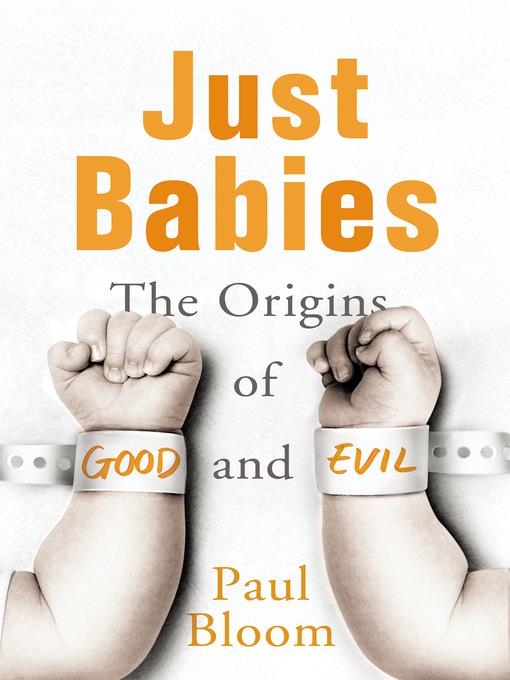Psychologists have long believed that we begin life as moral blank slates. Most of us take it for granted that babies are born selfish and that it is the role of society - and especially parents - to transform them from little sociopaths into civilised beings. Now, in Just Babies, Paul Bloom argue that humans are in fact hardwired with a sense of morality. Drawing on groundbreaking research, Bloom demonstrates that even before they can speak or walk, babies judge the goodness and badness of others' actions; act to soothe those in distress; and feel empathy, guilt, pride and righteous anger.
Still, this innate morality is limited. We are naturally hostile to strangers, prone to parochialism and bigotry. Drawing on insights from psychology, behavioural economics, evolutionary biology and philosophy, Bloom explores how we have come to surpass these limitations. Along the way, he examines the morality of chimpanzees, criminals, religious extremists and Ivy League professors, and explores out often puzzling moral feelings about sex, politics, religion and race.
Bloom rejects the fashionable view that adult morality is driven mainly by gut feelings and unconscious biases. Just as reason has driven our great scientific discoveries, it is reason and deliberation that makes possible our moral discoveries. Ultimately, it is through our imagination, our compassion and our uniquely human capacity for rational thought that we can transcend the primitive sense of morality we were born with, becoming more than just babies.
Vivid, witty, and intellectually probing, Just Babies offers a radical new perspective on our moral lives.
;
From Sigmund Freud to Jean Piaget, psychologists have long believed that we begin life as blank moral slates. Most of us take for granted that babies are born selfish and that it is the role of society - and especially parents - to transform them from little sociopaths into civilized beings. Now, in Just Babies, Paul Bloom argues that humans are in fact hardwired with a sense of morality. Drawing on groundbreaking research at Yale, Bloom demonstrates that, even before they can speak or walk, babies judge the goodness and badness of others' actions; act to soothe those in distress; and feel empathy, guilt, pride and righteous anger.
Still, this innate morality is limited, sometimes tragically. We are naturally hostile to strangers, prone to parochialism and bigotry. Drawing on insights from psychology, behavioral economics, evolutionary biology, and philosophy, Bloom explores how we have come to surpass these limitations. Along the way, he examines the morality of chimpanzees, criminals, religious extremists and Ivy League professors, and explores our often puzzling moral feelings about sex, politics, religion and race.
Moving seamlessly from the ideas of Darwin, Herodotus, and Adam Smith to The Princess Bride, Hannibal Lecter, and Louis C.K., Bloom rejects the fashionable view that adult morality is driven mainly by gut feelings and unconscious biases. Just as reason has driven our great scientific discoveries, he argues, it is reason and deliberation that makes possible our moral discoveries, such as the wrongness of slavery. Ultimately, it is through our imagination, our compassion and our uniquely human capacity for rational thought that we can transcend the primitive sense of morality we were born with, becoming more than just babies.
Vivid, witty and intellectually probing, Just Babies offers a radical new perspective on our moral lives.


دیدگاه کاربران